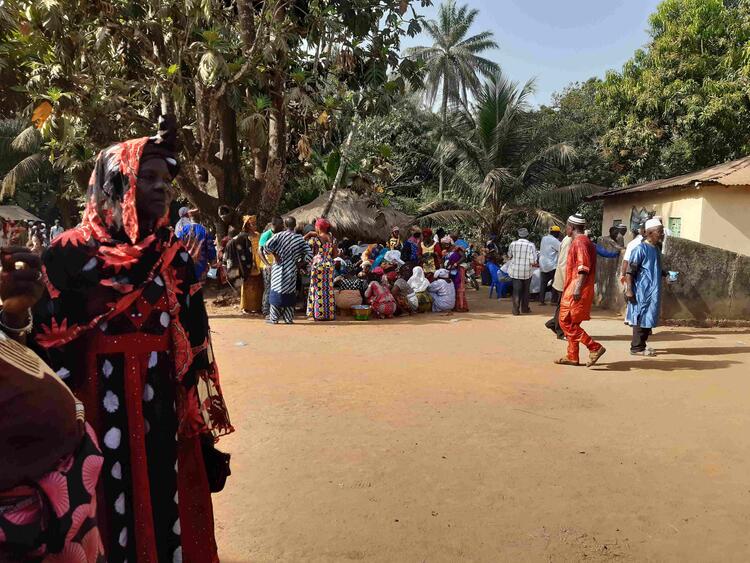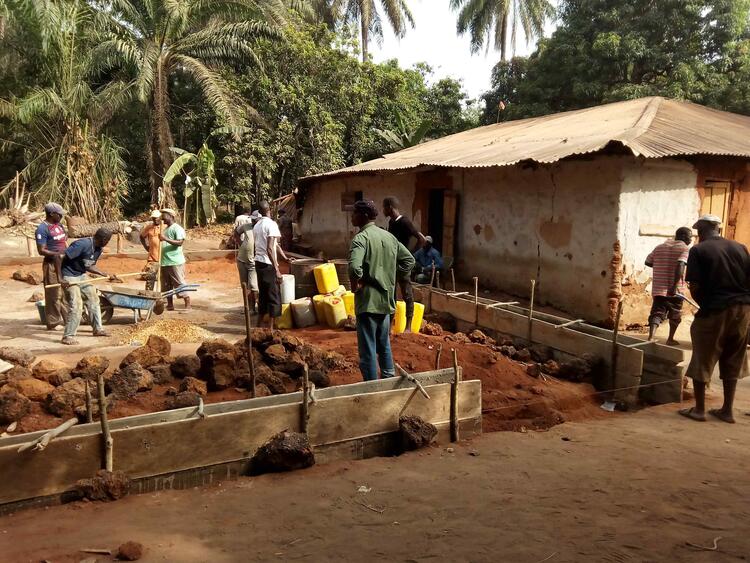Mogofindugu is a region that contains around 100 villages. These villages are located in the sub-provinces of Kolaboui and Bintimodia. Many Mogofin speakers live in or originate from these villages. Many Mogofin also live outside Mogofindugu. In towns such as Kamsar, Boké, Sangaredi, Boffa, Fria, Dubreka and Conakry. There are also Mogofin living outside Guinea. For example, there are Mogofin groups in Senegal and Gambia. Mogofin also live in Mauritania, Egypt, France, Germany and the USA.
Origin and characteristics of Mogofin
Mogofin is a Mandé language. On this side of Africa, there are many languages similar to Mogofin. Soso is another Mandé language frequently spoken in the proximity of the Mogofin region. Many Mogofin people also speak Soso when they meet people from other regions in the street or at the market.
The Mogofin originally descended from the Bambara (Mali), Koranko (Eastern Guinea) and Malinké (Guinea). In the 18th century, their ancestors fled because they were in danger of becoming slaves. They settled in what is now the Mogofin region. Over time, a unified language emerged: Mogofin. Some Mogofin men who had received Koranic education in other countries used this knowledge to teach Islam to the Mogofin. Sacrifice is an important part of Mogofin culture: distributing food, helping the poor or giving money are all forms of sacrifice (sarika), which can be used to obtain a blessing (barikè).
The Mogofin people of Mogofindugu live mainly from agriculture. During the rainy season, they grow rice, peanuts, cassava and sweet potatoes in their fields. During the dry season, many Mogofin plant rice on the flood plains. The palm trees provide the “red gold”, palm oil, which is partly for their own use, but is also sold in the big cities or abroad. Every family has a garden that produces fruit: oranges, cashews, mangoes, guavas, bananas, papayas, avocados, kola nuts and many other varieties. Together with the land, fruit trees are the most important part of the family inheritance. In addition to agricultural work, many people earn a secondary income as fishermen, tailors, bakers, basket-makers, masons, carpenters or Koranic teachers.
Education in the Mogofin language
Due to the presence of Islam and Koranic teaching, a large proportion of the population already knew Arabic script. Thanks to the education provided in schools in the Mogofin region, the number of Mogofin people able to read French script is constantly increasing. However, as the level of education is not always sufficient, and teaching aids are not widely available or are too expensive, it can take years before pupils can read and write properly. Moreover, the language of instruction is French, a language that children do not learn to speak at home.
Since 1994, translation experts from the MERN mission have been writing down the Mogofin language, describing its spelling and grammar rules. Since 2002, MERN has been organizing literacy courses. It has trained facilitators who help groups of Mogofin from different villages to learn to read and write. This work continues to this day. A group has also been formed which meets monthly to share knowledge: the MLƝ-group (seekers of knowledge).
The MERN mission also began translating the Holy Scriptures into the Mogofin language around the year 2000. Today, many texts from the Taureta, Jabura and Injila are available in the Mogofin language.
Developments in the Mogofin region
How many Mogofin are there? Estimates range from tens of thousands to hundreds of thousands. Perhaps a million. Mogofindugu is no stranger to global change either. In the past, there were virtually no means of transport, and everything was done on foot. Today, there are motorcycles in every village. And every year there are more cars. In the past, boys were sent on foot from one village to another to pass on messages. Today, basic phones are an integral part of Mogofin daily life. Last years, the Internet, smartphones and social media have also made their appearance. Internet access and coverage is improving every year.
A lot has changed in the last few decades. What can Mogofin do to ensure that their language and culture are not lost? What can we do to be taken seriously by government and society? How can the Mogofin region continue to develop? How can we ensure that our children continue to speak Mogofin? If they all start speaking Soso, it won't help us! As children of Mogofin, we must work to preserve our language. Even those who now live in other towns or countries!
Mogofin come together
As Mogofin, it's important that we make our voices heard to raise public awareness. The COGECOM board is made up of a group of key men from the Mogofin community. They have a long history of representing Mogofin to the government. You can find out more about them on this site.
In addition, two groups of NGO's (non-governmental organizations) have emerged in recent years. ONG BENDOUGOU and ONG MOOBATA. Both NGO's were created by Mogofin people to help their own people progress. The NGO's are strongly supported and financed by Mogofin living abroad. They both introduce themselves to you on this website. The Mogofin who participate in these NGO's show how important it is to them that the Mogofin language and culture continue to exist and that the Mogofin region continues to develop. It also shows that there is a strong family bond. They don't forget where they come from, and they like to see the prosperity of the Mogofin region grow.
By creating this website, the Mission MERN wants to show that it also wants to see the Mogofin region develop. May the Mogofin people help each other in peace and harmony, may the language be cherished and continue to exist, and may prosperity and knowledge in the Mogofin region increase. May God help us to support and honor each other. In this way, we will also honor Him as our Creator.

